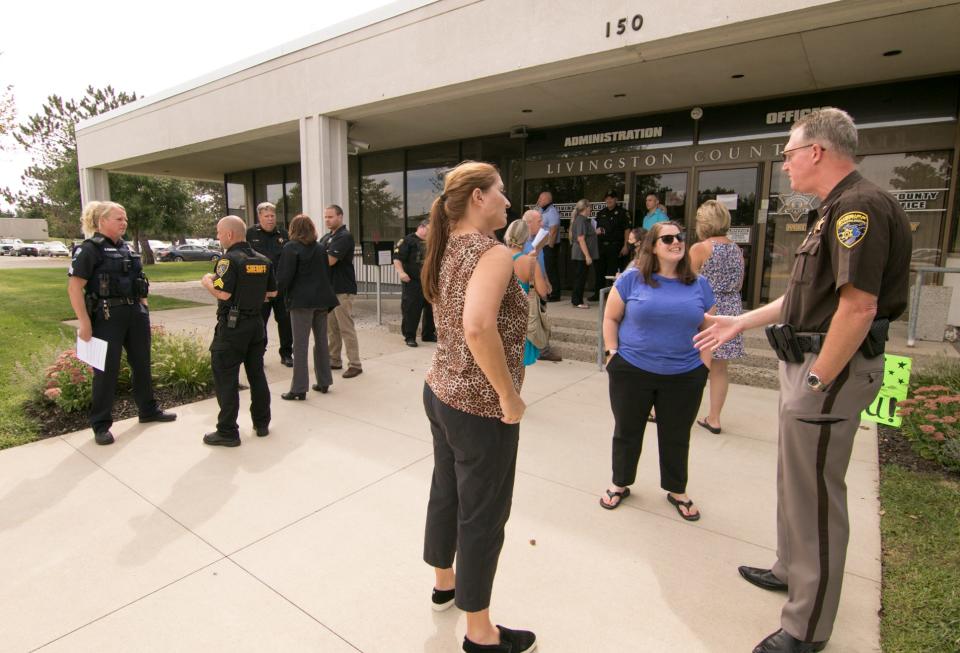The number of people being arrested is going down in Michigan. What's the story in Livingston County?
Criminal justice reforms instituted by the state in 2019 hastened a downward trend in the number of people lodged in jails following an arrest statewide, a situation Livingston County police officials say they are seeing locally.
Livingston County Sheriff Mike Murphy said a package of bills approved by the Legislature and signed by Gov. Gretchen Whitmer didn't change things that are defined as crimes, but allowed officers to simply write an appearance ticket instead of arresting people and lodging them in the jail.
State Court Administrator Tom Boyd was a member of the joint task force on jail reform. He said the vision of the reform was to keep people out of jail who were not a threat to public safety. A lot of people in Michigan jails were there because of debt or licensing issues.
"(Those people) being in jail wasn't making the community safer," he said.
Michigan has seen the number of arrests fall from 322,941 in 2007 — to 211,196 in 2019, and 162,282 in 2020, according to Michigan Incident Crime Reporting.
The trend has been as dramatic locally.
The Brighton Police Department reported 1,025 arrests in 2007 to just 290 in 2021. The Howell Police Department made 329 arrests in 2013 and only 130 in 2021.
The Livingston County Sheriff's Office reported 1,756 arrests in 2013 and 1,407 arrests in 2021. The number of people held by the Livingston County Sheriff's Office in the jail fell from 2,219 in 2019 to 1,495 in 2020.
The long-term goal of the 2019 reforms is ideally to have fewer people in the jails, Boyd said.
"We should incarcerate people we're afraid of, not people we're mad at," he said.
Even though local police agencies have been affected by the reforms, each has reported a variety of factors that have led to a decrease in people being taken into custody, including changes in what counts as a crime, the reforms, staffing and behavior by people overall.
Brighton Police Department
Brighton Sgt. Brent Pirochta, who will be taking over as police chief in October, said COVID-19 had a big impact on the work of the police department.
Pirochta said decriminalization of marijuana possession, which had been a misdemeanor or possibly a felony, had an impact.
Crimes, some traffic offenses and minors in possession of alcohol, were reduced from misdemeanors or felonies to civil infractions
Pirochta also said that in his 20 years working in Brighton, he's noticed a change in behavior.
"When I first started, we had a lot of drunks, drunk drivers," he said. "People are being more responsible."
He added that with people choosing to use services such as Uber or Lyft, there are fewer drunk drivers on the roads.
However, the police department is also being more proactive. For example, if officers notice an uptick in retail fraud at certain locations they try to make themselves more visible in those areas.
Howell Police Department
Howell Police Chief Steve Mannor said the decrease in people being lodged in jail by his department can be attributed to lower staffing levels, in addition to the reduction in severity or decriminalization of certain actions.
The Howell Police Department is authorized to have 20 employees, including support staff. Currently, they have 14.
Mannor said the lack of resources is a trend that can be seen across the country.
"Right now, we're all short," he said.
The lack of staff makes it harder to do community policing, he said, instead officers become reactionary, or just responding to calls when they come in.

Mannor said road patrol positions are among the most difficult to fill as officers often get promoted to other positions.
"I'm having a difficult time back-filling those positions," Mannor said.
In the last eight months, Mannor said, there's been an uptick in call-in complaints about speeding. So much so, that while school is out, the school resource officer is working as a traffic officer.
Livingston County Sheriff's Office
Sheriff Mike Murphy said numbers tend to go up and down.
Murphy said the most arrests made by his department are drunk drivers, domestic violence, traffic and probation violations.
However, since the pandemic started, Murphy said, it seems like there have been more domestic cases, and they've become more violent.
"People are just angry right now," he said.
Sophia Lada is a reporter for the Livingston Daily. Contact her at slada@gannett.com or 517.377.1065. Follow her on Twitter @sophia_lada.
This article originally appeared on Livingston Daily: Livingston County arrests are on a decrease. Here's what we know

